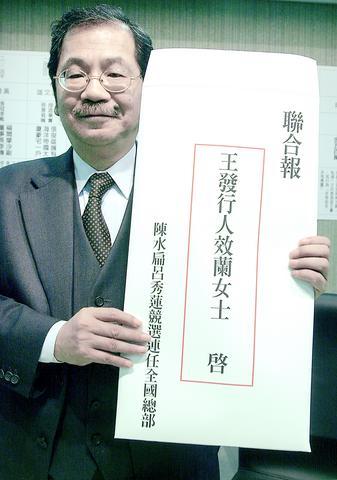The Democratic Progressive Party (DPP) yesterday accused the United Daily News (UDN) of tarnishing the reputation of President Chen Shui-bian (
Wu Nai-jen (
"The United Daily News published three stories, unverified and unattributed, on Feb. 6, 8 and 11 accusing the DPP government of involvement in a bribery scandal," Wu said. "But the stories do not have any specific evidence."

PHOTO: CHIEN JUNG-FENG, TAIPEI TIMES
"These stories not only mislead the public and hurt the president's honor, but also endanger the reputation of the United Daily News," he said.
Wu said the stories are in violation of Article 92 of the Election and Impeachment Law, which regulates spreading rumors in an attempt to affect the outcome of an election.
He called the media's performance during this presidential election campaign the worst in more than 20 years.
Wu said the intention of the United Daily News to sway the election has damaged the credibility of the media, and the DPP hopes the letter will prompt the newspaper to improve.
He cited an editorial in the United Daily News on its 47th anniversary that upheld "anti-communism, democracy, unification and progress" as its principles, but said the newspaper has violated its own principles and ethos.
Wu said the DPP could no longer put up with such irresponsible reports and that it decided to fight back against the paper.
"We will start with a rational appeal, but we haven't decided yet whether to take legal action against the United Daily News."
"Article 92 not only refers to civil issues but also may lead to imprisonment for five years," Wu said. "If the United Daily News fails to make an improvement, we will resort to legal procedures."
Responding to Wu's remarks, the paper issued a statement saying, "The United Daily News deals with stories according to journalistic professionalism and journalistic ethics."
It called on candidates to respect the media's role in society.
Meanwhile, the DPP's campaign headquarters said the pan-blue camp was using campaign tricks that have been condemned in other democratic countries.
"The first kind of blue-camp negative campaign trick is to make up facts and then implicate an opponent," Wu said, "like when former legislator Lin Ruey-tou (林瑞圖) claimed that Chen Shui-bian had gone to Macau for a wench in 1998.
"The second one is to create a sensational story for slandering. This includes when People First Party [PFP] Legislator Chiu Yi (
"The third is to viciously impute blame to another, such as when PFP Legislator Diane Lee (李慶安) accused former Department of Health head Twu Shiing-jer (涂醒哲) of being involved in a sexual harassment case in October 2002. She later apologized for accusing the wrong person," Wu said.
"The last kind is to spread slanderous rumors with groundless talk, such as PFP Chairman James Soong (
Wu said the blue camp's ridiculous rumors have developed to an evil degree and are even encouraged by the blue camp's vice presidential candidate, Soong.
"We hope the media do not serve as those evil tricks' accomplice," he said.

DAREDEVIL: Honnold said it had always been a dream of his to climb Taipei 101, while a Netflix producer said the skyscraper was ‘a real icon of this country’ US climber Alex Honnold yesterday took on Taiwan’s tallest building, becoming the first person to scale Taipei 101 without a rope, harness or safety net. Hundreds of spectators gathered at the base of the 101-story skyscraper to watch Honnold, 40, embark on his daredevil feat, which was also broadcast live on Netflix. Dressed in a red T-shirt and yellow custom-made climbing shoes, Honnold swiftly moved up the southeast face of the glass and steel building. At one point, he stepped onto a platform midway up to wave down at fans and onlookers who were taking photos. People watching from inside

A Vietnamese migrant worker yesterday won NT$12 million (US$379,627) on a Lunar New Year scratch card in Kaohsiung as part of Taiwan Lottery Co’s (台灣彩券) “NT$12 Million Grand Fortune” (1200萬大吉利) game. The man was the first top-prize winner of the new game launched on Jan. 6 to mark the Lunar New Year. Three Vietnamese migrant workers visited a Taiwan Lottery shop on Xinyue Street in Kaohsiung’s Gangshan District (崗山), a store representative said. The player bought multiple tickets and, after winning nothing, held the final lottery ticket in one hand and rubbed the store’s statue of the Maitreya Buddha’s belly with the other,

‘NATO-PLUS’: ‘Our strategic partners in the Indo-Pacific are facing increasing aggression by the Chinese Communist Party,’ US Representative Rob Wittman said The US House of Representatives on Monday released its version of the Consolidated Appropriations Act, which includes US$1.15 billion to support security cooperation with Taiwan. The omnibus act, covering US$1.2 trillion of spending, allocates US$1 billion for the Taiwan Security Cooperation Initiative, as well as US$150 million for the replacement of defense articles and reimbursement of defense services provided to Taiwan. The fund allocations were based on the US National Defense Authorization Act for fiscal 2026 that was passed by the US Congress last month and authorized up to US$1 billion to the US Defense Security Cooperation Agency in support of the

‘COMMITTED TO DETERRENCE’: Washington would stand by its allies, but it can only help as much as countries help themselves, Raymond Greene said The US is committed to deterrence in the first island chain, but it should not bear the burden alone, as “freedom is not free,” American Institute in Taiwan Director Raymond Greene said in a speech at the Institute for National Defense and Security Research’s “Strengthening Resilience: Defense as the Engine of Development” seminar in Taipei yesterday. In the speech, titled “Investing Together and a Secure and Prosperous Future,” Greene highlighted the contributions of US President Donald Trump’s administration to Taiwan’s defense efforts, including the establishment of supply chains for drones and autonomous systems, offers of security assistance and the expansion of